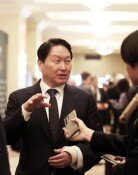North Rejects U.N. Council Resolution
North Rejects U.N. Council Resolution
Posted July. 17, 2006 03:49,
As the United Nations Security Council adopted a resolution against North Korea, the U.S. and Japan are likely to restrain any trading related to North Korean missiles and weapons of mass destruction (WMD) more strongly. Accordingly, money flow to the North is expected to be thoroughly blocked. It is unlikely, however, that the North will simply follow the decision made by the U.N. Security Council.
North Koreas Response-
With regard to the U.N. Security Council resolution, North Korea made a prompt and strong reaction of total rejection. In this regard, the dominant view is that for the time being, the North is extremely unlikely to immediately come back to the six-party talks without any preconditions as the Security Council urged it to.
In this case, North Korea has two options. One of them is to provoke the international community by launching more missiles or making a nuclear test. In the process of the Security Councils discussions over the resolution that began early this month, the North has never expressed its position, either officially or unofficially, and never contacted any members of the Security Council. Some interpret this as an attempt to let the international community know its plan to go its own way regardless of the U.N. Security Council resolution.
The Norths holding a meeting of overseas mission chiefs this week might also be to discuss strong measures against pressures from the U.S. and Japan and the resolution by the Security Council. Nevertheless, it has not been identified whether the decision to hold the meeting was made before or after its missile launch on July 5.
It is widely expected that if the North pushes for another missile launch or nuclear testing, the situation will go out of control. By adopting a new U.N. resolution, the U.S. and Japan will immediately carry out more all-out economic sanctions against North Korea, and might even consider military measures.
Due to its failure to persuade North Korea in the process of discussing the U.N. Security Council resolution, China is also unlikely to take the North under its wing.
Japan, in particular, is expected to take strong measures against the North. It is likely to extend the six-month embargo on the North Korean passenger-cargo ship Mangyeongbong, and it might also suspend money transfers to, and trading with, the North on the basis of the revised Foreign Currency Law.
This is why many believe the North may vow to take strong measures, but will not put them in practice. If the U.N. Security Council pursues comprehensive economic sanctions and considers military measures, North Korea will have to face the pressure. Some forecast it might take a third measure, which might not be at the level of missile launches or nuclear testing, but be something with which it can save face.
The U.S. and Japanese Responses-
The U.S. and Japan are expected to take active measures to pressure North Korea based on the Security Council resolution. Part of the resolution that can deal a serious blow to the North is that it be denied access to any gains from exporting missile- or WMD-related commodities, materials, goods and technologies.
If the U.S. and Japan make issues of all the external dealings of North Korea that are suspected, though slightly, to be missile- or WMD-related exports, and take ensuing financial sanctions, chances are that its external economy might be virtually paralyzed. Given the nature of the financial market, ripple effects from financial sanctions in one area rapidly spread to other areas, dealing a serious blow to the North.
On the basis of the U.N. Security Council Resolution in May 1993 to call for a return to the Nuclear Non-Proliferation Treaty (NPT), which they reaffirmed at the outset of the recent resolution, the U.S. and Japan might pressure North Korea to accept a nuclear inspection through the Security Council.
It seems that the U.S. will actively pursue five-party talks excluding the North, driving it into a tight corner. Japan agrees with the U.S. over the issue. It is expected that if five-party talks are held, the two countries will concentrate on coming up with new measures to put pressure on the North.
South Korea is against economic sanctions and any practical measures against North Korea, but is not opposing the idea of holding five-party talks. Vice Foreign Minister Lee Gyu-hyung reportedly visited China from July 15 to July 16 to meet Chinese Foreign Minister Li Zhaoxing and Vice Foreign Minister Wu Dawei to discuss the issue of five-party talks.
Myoung-Gun Lee Young-A Soh gun43@donga.com sya@donga.com







